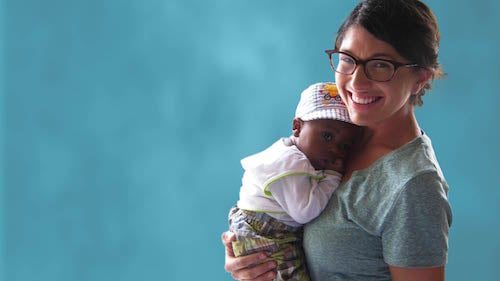Gina Wilson ’10

Humanitarian Award
UNC Charlotte Magazine Contributed to this article.
A mother in Moshi, Tanzania, is hemorrhaging while doctors deliver her ashen-faced infant. After failed attempts to stimulate the baby’s breathing, a midwife instructs UNC Charlotte alumna Gina Wilson to wrap the newborn in a blanket and set it aside.
For her final clinical rotation to become a family nurse practitioner, Gina helped deliver babies at a family clinic at the base of Mount Kilimanjaro. “I was on cloud nine delivering babies,” she says. “Then (that) delivery went really, really wrong.
“That moment in time changed my life.”
Rewind a few years: Gina earned her Bachelor of Science in Nursing in 2010 while on a softball scholarship. She then began working in women’s health at Wake Forest Baptist Medical Center. With the goal of becoming a family nurse practitioner, she enrolled in the Master of Science in Nursing Program at Duke University in 2013. It was at that point that she first visited Tanzania.
She learned that a high percentage of babies born in that country die from breathing difficulties at birth, similar to what she experienced at the Moshi clinic. One in every 38 deliveries is classified as a stillbirth in nearby Zanzibar, Tanzania. She decided to enter the nursing doctorate program at Duke, focusing her dissertation on her work on reducing infant mortality in Tanzania.
Gina became familiar with Helping Babies Breathe (HBB), a newborn resuscitation program developed by the American Academy of Pediatrics. She took the training with the goal of taking the program to nurse midwives in Tanzania and training them so they could teach others. Previously, HBB had only been done with a dozen or fewer health professionals who were not necessarily on the front lines of deliveries.
Gina had to obtain government approval for the program and raise $1,800 for supplies before she began her effort. “Some people laughed at me — they said there was no way I would get permission from the government,” she recalled, noting that it took persistence and flexibility to accomplish.
To raise money, she organized events, sent out letters, and partnered with ChaRA, a charitable organization in Zanzibar. Together, they work to minimize neonatal mortality and stillborn rates by educating midwives to be master trainers who can instruct other district and village midwives in HBB techniques.
As of early 2017, 90 midwives have been trained, 45 of whom work in the country’s two largest delivery centers, delivering about 17,000 babies annually. “I wanted to help people when I came to Charlotte, and nursing was the perfect fit — to be the hands and feet that love and care for people.”